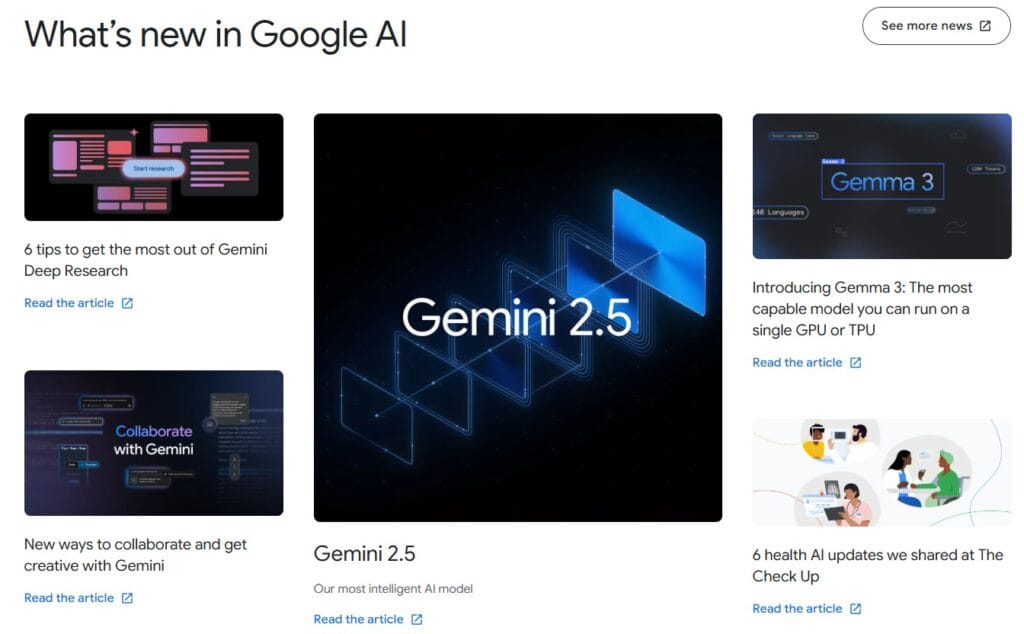Google AI’s definition, core technologies, industry applications,
Introduction to Google AI: A Paradigm of Intelligent Innovation
Google AI, the research and development arm of Alphabet Inc., stands at the forefront of artificial intelligence innovation. Originally branded as Google Research, it was reorganized in 2018 to focus on advancing AI technologies that enhance products like Google Search, Maps, Assistant, and Gemini 2. This post delves into Google AI’s definition, technical architecture, real-world applications, competitive advantages, and ethical commitments, positioning it as a leader in the global AI landscape.
What is Google AI?
Google AI refers to a suite of technologies and research initiatives aimed at creating systems that simulate human intelligence. It encompasses machine learning (ML), deep learning, natural language processing (NLP), robotics, and computer vision. Unlike narrow AI tools designed for specific tasks, Google AI integrates multimodal capabilities—processing text, images, audio, and video—to deliver versatile solutions across industries 210.
Key Components:
- Machine Learning (ML): Algorithms trained on vast datasets to predict outcomes or classify information.
- Deep Learning: Multilayered neural networks that automate feature extraction from unstructured data, such as images or speech 10.
- Generative AI: Models like Gemini (formerly Bard) that create text, code, and multimedia content 2.
How Google AI Works: Technology Under the Hood
Google AI operates through a three-stage pipeline: data processing, model training, and real-world deployment.
1. Data Collection and Processing
Google AI leverages data from user interactions (e.g., Search queries, Maps navigation) and ethically sourced public datasets. This data is cleaned and structured using tools like TensorFlow, Google’s open-source ML framework 210.
2. Model Training
- Supervised Learning: Labeled data trains models to recognize patterns (e.g., spam detection in Gmail) 10.
- Reinforcement Learning: Systems like AlphaCode 2 learn through trial and error, optimizing tasks like competitive programming 2.
- Transformer Models: Power NLP applications, enabling Google Search to interpret complex queries and deliver context-aware results 9.
3. Deployment and Integration
Trained models are integrated into Google’s ecosystem:
- Search Algorithms: RankBrain and BERT improve query understanding and result relevance 9.
- Google Assistant: Uses NLP to schedule appointments or answer questions in real time 2.
What Can Users Do with Google AI? Applications Across Industries
Google AI’s versatility drives transformative solutions in diverse sectors:
1. Healthcare
- Diagnostics: Analyzes medical records and retinal images to detect conditions like diabetic retinopathy 2.
- Drug Discovery: Accelerates pharmaceutical research by predicting molecular interactions 10.
2. Business and Marketing
- Smart Bidding: Automates ad auctions in Google Ads using ML to maximize ROI 2.
- Personalized Recommendations: Powers YouTube and Google Shopping suggestions based on user behavior 9.
3. Education
- Personalized Learning: Tailors lesson plans via AI-driven analysis of student performance 11.
- Automated Grading: Reduces administrative workload for educators 11.
4. Environmental Sustainability
- Flood Prediction: FloodHub uses AI to analyze weather patterns and issue early warnings 2.
- Agricultural Optimization: Enhances crop yields through data-driven insights 8.
Advantages of Google AI
1. Seamless Ecosystem Integration
Google AI tools are embedded into widely used platforms like Workspace, Android, and Cloud, ensuring accessibility and scalability 29.
2. Ethical AI Principles
Google adheres to strict guidelines, avoiding harmful applications and prioritizing transparency. Initiatives like AI for Social Good address global challenges like climate change and healthcare disparities 2.
3. Multimodal Capabilities
Unlike single-purpose tools, Google AI processes interleaved data types. For example, Gemini generates code while analyzing images, streamlining workflows for developers 2.
4. Cost Efficiency
Free tiers for tools like TensorFlow and Gemini Pro democratize access for startups and researchers 210.
Google AI vs. Competitors: A Comparative Analysis
| Feature | Google AI | ChatGPT (OpenAI) | Microsoft Copilot |
|---|---|---|---|
| Integration | Deep ecosystem (Search, Android, Cloud) | Limited to OpenAI/Bing plugins | Microsoft 365 and Azure services |
| Multimodality | Native (text, images, audio, video) | Text-focused with plugin support | Text and code generation |
| Ethical Safeguards | Constitutional AI principles 2 | Basic content filters | Azure AI ethics framework |
| Cost | Free tiers + scalable enterprise plans | $20/month ChatGPT Plus | Bundled with Microsoft 365 |
Why Google AI Stands Out
- Search Dominance: Processes 99,000+ queries per second with AI-driven accuracy 9.
- Open-Source Tools: TensorFlow and Keras empower developers to build custom ML models 10.
- Real-Time Adaptability: Models like RankBrain update dynamically based on user interactions 9.
Future of Google AI: Trends to Watch
- Agentic AI: Projects like Astra aim to create AI assistants with 10-minute memory for personalized interactions 2.
- Quantum Computing: Integration with quantum algorithms to solve complex optimization problems.
- AI-Driven Climate Solutions: Expanding FloodHub and wildfire prediction systems 8.
Conclusion: Harnessing Google AI for a Smarter Tomorrow
Google AI redefines innovation by merging cutting-edge technology with ethical responsibility. From enhancing search accuracy to revolutionizing healthcare, its applications are limitless. By prioritizing user trust and open-source collaboration, Google AI not only outperforms competitors but also sets a benchmark for responsible AI development. As industries evolve, Google AI remains a cornerstone of intelligent, inclusive progress.
Optimized Keywords: Google AI, machine learning, natural language processing, generative AI, TensorFlow, ethical AI, AI applications, multimodal AI, Google Gemini, AI tools.
Focus Phrases:
- “Ethical AI principles”
- “Machine learning algorithms”
- “Generative AI capabilities”
- “Google AI applications in healthcare”
- “AI-driven search optimization”




Leave a Reply